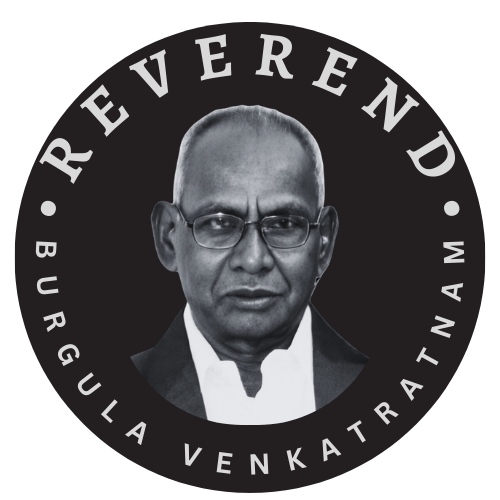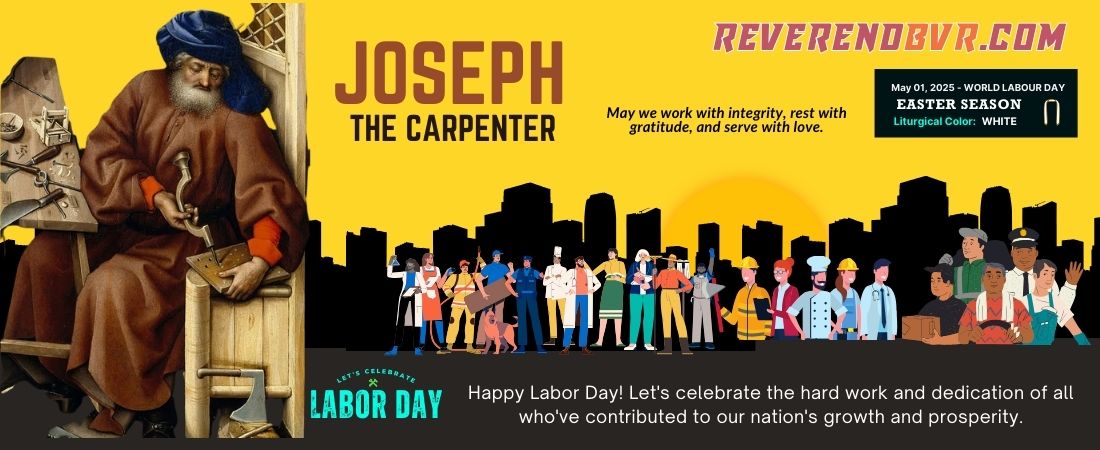World Labour Day, May 1, 2025 | Theme: Joseph the Carpenter | Bible Readings: Genesis 1:26–2:3, Psalm 15, 2 Thessalonians 3:6–15, John 5:1–10
Introduction: The Dignity of Work and the Model of Joseph, the Carpenter
On this World Labour Day, celebrated on the 1st of May, the Church of South India joins the global community in reflecting on the dignity of human labour. This year’s theme, “Joseph the Carpenter (τέκτων, tekton)”, invites us to contemplate the life and witness of Joseph—the earthly father of Jesus—who embodied the holiness and integrity of everyday work. In him, we see how Scripture and the life of Christ uplift and sanctify our labour, whatever our calling may be.
May 1st, celebrated worldwide as International Workers’ Day, honors the struggles and victories of labour movements—born from the 1886 Haymarket Affair in Chicago and championing fair wages, safe conditions, and dignity at work. In India, Labour Day was first observed in 1923 in Chennai, led by Comrade Singaravelar, a pioneering trade unionist and freedom fighter. In a nation where millions work across formal and informal sectors, this day reminds all the leaders and faith communities to uphold justice, equality, and the dignity of every worker. It is into this context—global and local—that we revisit the biblical vocation of work, embodied in the life of Joseph the Carpenter.
1.Joseph the Carpenter: Tekton in Biblical Context
In the New Testament, Joseph is referred to as a “tekton” (Greek: τέκτων), a term traditionally translated as “carpenter.” However, this Greek word broadly encompasses a craftsman or artisan—one skilled in working with wood, stone, or metal. In a town like first-century Nazareth, stone was more common than wood in construction, making Joseph more likely a general builder or stoneworker than the modern image of a carpenter with wood alone (cf. Matthew 13:55; Mark 6:3).
By identifying Joseph as a tekton, the Scriptures highlight the dignity of manual labour. Jesus, too, is described using the same term. He spent his early adult life apprenticed to Joseph, engaging in the daily realities of craftsmanship and construction. This period of hidden labour in Nazareth forms a theological cornerstone: that God dignifies and sanctifies human work by becoming incarnate and participating in it.
Early Church Fathers such as Justin Martyr affirmed this truth, stating that Jesus “was known as a carpenter,” thus sanctifying work itself through divine embodiment (cf. Dialogue with Trypho, ch. 88).
2. Work as a Divine Vocation (Genesis 1:26–2:3)
The creation account in Genesis affirms work as a divine vocation. Humanity is made in the imago Dei—the image of God—and given the mandate to steward creation (Genesis 1:26–28). This stewardship involves labour: naming the animals, cultivating the garden, subduing the earth. The act of God working for six days and resting on the seventh sets a divine pattern. Work is not a result of the Fall; it is a gift, part of humanity’s original blessing and calling. The Hebrew word avodah is used throughout the Old Testament to mean both “work” (Genesis 2:15; Exodus 1:14) and “worship,” ( Exodus 3:12; Exodus 13:5 and Numbers 8:11) illustrating a seamless integration of labour and liturgy.
“The Hebrew word avodah appears across Scripture to describe both manual labour and acts of worship. In Genesis 2:15, Adam is placed in the garden to work (la‘avod) it, and in Exodus 3:12, Israel is redeemed from Egypt to worship (ta‘avdun) God. This linguistic overlap reveals a profound biblical vision: that labour, when rightly ordered, is a form of worship.”
This theological view of labour counters any dichotomy between secular and sacred. All honest work, when done faithfully, is an act of worship. Joseph models this in his quiet, faithful fulfilment of his duties.
3. Integrity in Work and Life (Psalm 15)
Psalm 15 outlines the character of one who may dwell with God. Central to the psalm is integrity—speaking the truth, doing no wrong to neighbours, honoring one’s word even at a cost. These are also the traits we see in Joseph, who, upon learning of Mary’s pregnancy (through the Holy Spirit.), Being a just man and unwilling to put her to shame, resolved to divorce her quietly” (Matthew 1:19, ESV). His righteousness was not merely in belief but in action.
Today’s labourers, artisans, and professionals alike are called to this integrity. The marketplace, factory floor, office, and classroom all become altars of righteousness when infused with honesty, diligence, and compassion.
4. The Ethic of Responsible Labour (2 Thessalonians 3:6–15)
Paul’s words to the Thessalonians confront idleness and affirm the apostolic model of work. “The one who is unwilling to work shall not eat” (2 Thess. 3:10). Paul reminds the church that he and his companions worked day and night, not to burden others, but to set an example. This is not a dismissal of those unable to work, but a call to those able-bodied to embrace work as both responsibility and witness.
The Greek verb ergazomai (ἐργάζομαι), meaning “to labor or work,” appears repeatedly in this passage, highlighting labour as a shared moral and communal duty.
Joseph embodies this ethic. Though little is written of his speech, his life speaks volumes. He obeys God’s direction in dreams. He protects his family by fleeing to Egypt. He raises Jesus with care and love. His life, marked by work, fatherhood, and faith, teaches us that labour is not merely for survival but for service.
5. Christ Heals and Restores on the Sabbath (John 5:1–10)
In John 5, Jesus heals a man who had been an invalid for thirty-eight years. Notably, He does so on the Sabbath, provoking controversy. Jesus’ action demonstrates that the Sabbath is not about mere cessation from effort, but about restoration and mercy. Human need takes precedence over ritual rigidity.
This story reminds us that even on days of rest, we are called to restore, to lift burdens, and to bless. Our labour, like our rest, must be guided by love and compassion.
6. Theological Reflections on Labour and Justice
The Church, drawing from Scripture, consistently affirms the dignity of workers and the justice of fair employment. Rooted in God’s creation mandate and Christ’s incarnation, we affirm:
- The right to a just wage
- The right to rest and leisure
- The right to safe working conditions
- The right to social protection in sickness, old age, and unemployment
- The right to unionize and advocate for justice
These rights find grounding not in political ideology but in biblical theology and the justice of God. The Church must speak prophetically in defence of the oppressed and labouring classes, recognizing that every form of exploitation or neglect is a sin against God’s image in others.
Liturgically, the life of Joseph invites us to see daily work as sacramental—a site of divine encounter. Ordinary labour, like the bread and wine, becomes a vehicle of grace when offered in faith.
Michelangelo’s unfinished Slaves sculptures poignantly express this theology—figures emerging from stone suggest the tension and beauty of human striving, constraint, and creation.
7. National Context: Labour in India
India’s Constitution enshrines the dignity of labour through various articles and protections:
- Article 14: Equality before the law*
- Article 19(1)(c): Right to form associations
- Article 21: Right to life and liberty*
- Article 23: Prohibition of forced labour
- Article 24: No child labour under 14
- Article 39(a): Right to a livelihood
- Article 41: Right to work and education
- Article 42: Humane working conditions
- Article 43: Living wage
- Article 43A: Worker participation in management
* General rights for everyone (workers included).
Recent labour reforms through new codes (Social Security Code, Occupational Safety Code, Industrial Relations Code) aim to streamline protections. The Church must remain vigilant and pastoral, ensuring these laws translate to justice and dignity on the ground.
8. Conclusion: Labour as Liturgy
Joseph the tekton worked not just with tools, but with trust. He laboured not for fame, but for faithfulness. His workshop was a place of devotion, where the Son of God learned to handle wood before bearing a wooden cross. On this Labour Day, let us remember that in Christ, our work—when done in faith and righteousness, becomes worship. May we work with integrity, rest with gratitude, and serve with love.
9. Closing Prayer
Gracious God, you are the Creator of all things and the Author of work. We thank you for the gift of labour and for the example of Joseph the carpenter, who bore witness to your grace through humble service. Strengthen the hands of all workers. Comfort the unemployed. Inspire those in authority to ensure justice and dignity in every workplace. May we, like Joseph, honour you not only with our words but with the work of our hands. In Jesus’ name we pray. Amen.
10. To provide a structured theological and practical perspective, we present the key insights from this sermon in the following table:
| Topic/ Verse of Meditation | Theological Insight | Contemporary Application | Academic Perspective |
| Joseph the Tekton | Labour is dignified by divine participation | All labour is holy and vocational | Linguistic roots: tekton as broader than “carpenter”; cultural-historical setting of 1st-century Nazareth |
| Genesis 1:26–2:3 | Work as imago Dei and vocation | Work is not a punishment, but a divine calling | Reflects ancient Near Eastern cosmology; theological anthropology of work; Hebrew avodah = work/worship |
| Psalm 15 | Integrity as a condition of divine fellowship | Character in the workplace is a spiritual testimony | Wisdom literature ethics applied to economics and public life |
| 2 Thessalonians 3:6–15 | Responsible labour as Christian witness | Idleness undermines community; industriousness uplifts it | Pauline ethic rooted in Greco-Roman codes; Greek ergazomai (to labor) and its implications |
| John 5:1–10 | Healing over ritualism | Compassion takes precedence over rigid legalism | Johannine theology of sabbath, mercy, and human need |
| Theological Reflections | Rights grounded in the justice of God | Advocacy for dignity, justice, and fairness | Public theology intersects with labour rights and biblical justice; Oliver O’Donovan’s political theology |
| Indian Legal Framework | Indian Constitution affirms dignity of labour | Law as a tool for upholding imago Dei in society | Intersection of theology, ethics, and constitutional law; Amartya Sen’s Development as Freedom |
Bibliography
- Holy Bible References: Genesis 1–2; Psalm 15; 2 Thessalonians 3:6–15; John 5:1–10
- Wright, N.T. Paul: A Biography. HarperOne, 2018.
- Brueggemann, Walter. Sabbath as Resistance: Saying No to the Culture of Now. Westminster John Knox Press, 2014.
- Keller, Timothy. Every Good Endeavor: Connecting Your Work to God’s Work. Dutton, 2012.
- Indian Constitution Provisions for Labour.
- India Code Portal – indiacode.nic.in & Telangana Labour Acts and Rules
- Sen, Amartya. Development as Freedom. Oxford University Press, 1999.
- O’Donovan, Oliver. The Desire of the Nations: Rediscovering the Roots of Political Theology. Cambridge University Press, 1996.
- Justin Martyr, Dialogue with Trypho.
- Michelangelo, The Slaves (Unfinished Sculptures).
As you go forth from this reflection, may you find renewed purpose in your work. Let the quiet strength and faithfulness of Joseph inspire you to honour God through the labour of your hands and the integrity of your life.
May we work with integrity, rest with gratitude, and serve with love.
For more sermons and biblical reflections, visit:
🌐 www.reverendbvr.com/sermons

